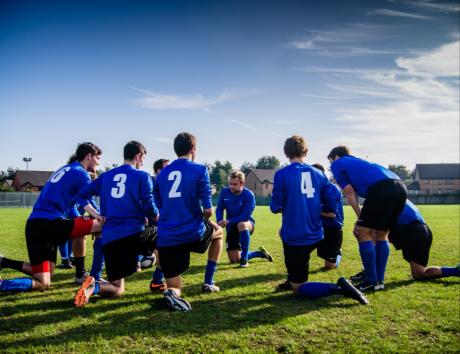How to Add Extracurricular Activities to Your Resume/CV
Getting a job isn’t easy when you’ve just left school or university. Even for entry-level jobs, employers require some experience which seems paradoxical. How else can you stand out from the crowd and convince employers that you have the necessary skills for the job? One way to do this is to list your extracurricular activities in your CV/resume.

Including Extracurricular Activities on a Resume/CV
The word ‘extracurricular’ refers to educational activities that fall outside of the scope of the school or university curriculum. Unlike hobbies, these activities are pursued with the purpose of developing skills for the job market.
While you want to primarily focus on your skills, knowledge, and work experience in your CV, your extracurricular activities can boost your application. They show employers that you’re invested in developing your skills and learning new ones – a trait that every employer values.
When To List Extracurricular Activities on Your Resume
You have little to no work experience
If you’re new to the job market, extracurricular activities can help make up for your lack of practical work experience. Getting a job can be challenging, especially if you’ve pursued a course or degree that doesn’t lead straight into a job. By including activities that demonstrate, for example, leadership, communication skills and teamwork on your resume, you increase your chances of employers viewing you as a suitable candidate.
Extracurriculars can also be a way to reinforce your technical skills. For example, if you are a member of the coding club at school and you are seeking an internship or position in computer programming, employers will see that you have made an extra effort to hone your skills and that you enjoy the field enough to spend your free time learning and improving your craft.
You have extensive work experience
Even if you have extensive work experience, your extracurricular activities can be a valuable addition to your resume. They’re a great way to show employers that you have a range of valuable skills and that you’re willing to go the extra mile to develop them.
List of good extracurricular activities for your CV
If you choose to mention your extracurricular activities in your CV, you may be wondering which ones to include. The best answer is, list the activities that are tied to skills mentioned in the job description. That way, employers can see how they relate to the role you’re applying for.
That said, here are some activities which you may want to add to your CV:
1. Sports
Participating in organized sports shows potential employers that you are dedicated, know how to work as part of a team, and care about your physical health and well-being. You might also wish to list transferable skills like perseverance, communication, strategizing, and collaboration in association with your sports experience on your resume.
Additionally, if you were a team captain, you could mention that as a demonstration of your leadership skills.
Key Skills Developed from Sports: Self-motivation, teamwork, people skills, strong work ethic, dedication, reliability, strategizing, collaboration, communication, quick thinking, time management, leadership
“Leadership ability is one of the most desirable qualities that you can have as a job seeker, and including activities that actually show your leadership skills in action is much more effective than simply listing ‘leadership’ in your skills section.”
2. Arts & Theatre
Activities like theater, music, photography, and art are also excellent extracurriculars to include on your resume. These types of pursuits can show that you are creative, have a good memory, are detail-oriented, and are dedicated to improving your skills. Many artistic ventures also involve some type of public performance or showcase, which tells employers that you can present to a group and have experience with public speaking or performing.
Whether you took part in a play, played for the school orchestra, or attended pottery classes, these activities also display a creative side to your personality in your CV as well as teamwork.
Key Skills Developed from Arts: Creativity, strong memory, critical thinking, presentation skills, public speaking, detail-oriented, dedication, passionate
3. Volunteering
Volunteering allows you to give back to your community, and employers will certainly take note of your altruism and willingness to serve. Fundraising, delivering meal packages, or helping out in charity shops are just some examples of volunteering that demonstrate goodwill towards others, compassion, and teamwork.
Listing your volunteering activities on your resume also lets employers know which causes are close to your heart and gives them an insight into your personality.
Key Skills Developed from Volunteering: Altruistism, willingness to serve, motivation, self-starter, optimism, teamwork, passionate
4. Languages
For companies with a global customer base, your language skills can set you apart from other candidates. Learning languages demonstrates dedication as well as the willingness to learn about new cultures.
You could mention how you developed your skills in language classes, clubs, or tandems. If you’ve had the opportunity to travel or study abroad, even better.
Key Skills Developed from Learning Languages: Dedication, willingness to learn, open-mindedness, intercultural awareness, interpersonal skills, global citizenship
5. Tutoring or Mentoring
Tutoring or mentoring your peers or younger students suggests that you are a high-achiever, capable of teaching or training others, and dedicated to academic excellence. One way to impress employers is to list any peer mentoring programmes you may have taken part in. Teaching allows you to further solidify your understanding of a subject, and you are demonstrating a willingness to spend your free time helping others succeed. Plus, explaining a subject in a way that someone else can understand prompts you to consider other viewpoints, thought processes, and abilities.
Key Skills Developed from Mentoring: Communication, subject matter expertise, teamwork, creative thinking, flexibility, adaptability, altruism, patience
6. Clubs and societies
Clubs and societies are invaluable for developing a whole range of skills. Many high schools have a variety of clubs such as math team, quiz/knowledge bowl, debate club, speech team, and so forth. It takes a lot of time and effort to actively participate in clubs and societies in addition to lectures and studying. The wide variety of responsibilities that club members usually are a great addition to resumes: club treasurer, social media manager, chairman.
Key Skills Developed from Clubs: Subject matter expertise, teamwork, leadership, stress tolerance, intelligence, communication, collaboration, competence
Where do you put extracurricular activities on your CV?
It’s up to you where you want to list your extracurricular activities on your resume.
If you want to give more weight to your academic experience, the best place to include them is in the ‘Education’ section of your CV. You could also draw attention to any awards or certifications you were awarded whilst taking part in the activity.
Another option is to list your activities in an ‘Extracurricular Activities’ section in your resume to show employers that you have interests outside of study or work. You can take a look at many CV examples on Jobseeker to get inspiration on how to include extracurricular activities on your resume.
Expert Tip:
Alternatively, you could add an ‘Achievements’ section to your resume to highlight your accomplishments in each role, in the same way as the ‘Work Experience’ section. With our resume templates you can easily add or remove information such as extracurricular activities to your CV.
Should you include extracurricular activities on your resume?
Tailoring your resume to each job posting can help it pass applicant tracking system (ATS) scans, score your interviews, and ultimately get you hired for your target position. As such, it’s always a good idea to tailor your extracurriculars as well. Only include those that are relevant to the job or that have allowed you to practice skills that apply to the position.
If you have any doubts about whether the activity belongs on your CV, ask yourself the following questions:
- What skills did I gain?
- Are these skills mentioned in the job description?
- Is there any chance that the employer will look at my application unfavourably if I include the activity?
If the answer to the last question is yes, then leave it off your CV. Your resume is a marketing document to sell yourself, so it’s ultimately up to you which skills, experience and activities you mention. The key is to select the ones that present you in the best possible light. Be sure to highlight the skills that you’ve learned with bullet points under each activity.
Need help crafting the perfect resume that highlights your extracurricular activities? Check out Jobseeker’s many resume examples or professional resume creation tool. Simply enter in your details and easily swap between CV layouts, styles, and colors with just a few clicks. Then download your CV instantly and get started applying for jobs!
Impress employers with your CV
Step-by-step guidance to create a professional CV in minutes.



